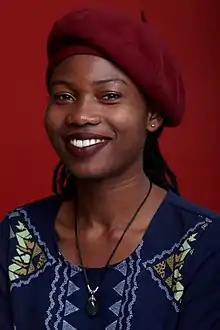Mylène Flicka
Mylène Flicka (born 22 July 1996) is a blogger, activist and social media entrepreneur from Benin.
Mylène Flicka | |
|---|---|
 | |
| Born | Marie-Madeleine Fifamè Akrota 22 July 1996 |
| Pen name | Mylène Flicka |
| Occupation | Activist; Blogger; Digital Media |
| Language | French |
| Nationality | Beninese |
Biography
Marie-Madeleine Fifamè Akrota was born on 22 July 1996.[1] She adopted the pseudonym Mylène Flicka when she was 14 years old, inspired by Mary O'Hara's novel My Friend Flicka.[2] Aged 17, Flicka began her first blog, which was dedicated to highlight issues around women's rights in Benin.[2] It was spurred into action by the declaration of a Beninese businessman that women had no use in the workplace.[3] In 2011 she came first place in Benin's Literary Baccalaureate.[4]
In 2015, using money from her student grant, she set up Irawo Media in order to showcase role models for young people from Benin and beyond.[2] She also graduated in Benin with a Diploma from the National School of Administration and the Judiciary.[4] In 2018 she began to study for an MBA in Paris.[4]
Irawo focuses on profiling young people from francophone Africa in particular.[5] One of the first people to be profiled by Flicka was Marie-Cécile Zinsou, many other notable African has followed since.[1]
Activism
Flicka has coordinated several online campaigns, including #GiveMeMyCredit in 2016 which campaigned for creatives, such as photographers, to be able to keep the rights to their work and to be credited when it is used.[2] In the same year, Irawo exposed government corruption in water supply to the rural village of Bonouko.[6] In 2017 she ran a campaign on social media called #FreeMyBoobs, which tried make it more acceptable for women to not wear a bra.[2] In September 2017, Flicka gave her first TEDx talk.[7]
In 2018 Flicka was part of the #TaxePasMesMo (translation: Don't Tax My Megabytes) campaign, where the government of Benin had tried to levy a social media tax on internet access, texts and calls.[8] Flicka helped to organise and social media campaign, as well as peaceful protest around the cities.[9] After ten days, the government withdrew the tax.[9] Internet Without Borders gave their support to the campaign and Flicka works as an adviser to them.[10] In October 2018 Flicka was sponsored by UNICEF to address the French National Assembly on World Girls Day.[11]
References
- "Irawo Talents : Mylène Flicka porte la voix des jeunes étoiles africaines – Jeune Afrique". JeuneAfrique.com (in French). 2018-11-21. Retrieved 2020-02-24.
- "Mylène Flicka ou les lettres libres d'une Béninoise engagée". Le Monde.fr (in French). 2017-09-24. Retrieved 2020-02-24.
- ICI.Radio-Canada.ca, Zone International-. "Mylène Flicka rêve l'Afrique". Radio-Canada.ca (in French). Retrieved 2020-02-24.
- "Mylène Flicka, l'art de chasser les talents". Le Temps (in French). 2018-03-28. ISSN 1423-3967. Retrieved 2020-02-24.
- Kolawole, Oluwanifemi (2020-02-03). "Irawo, Beninese media startup, is putting francophone African talents in the spotlight". Techpoint.Africa. Retrieved 2020-02-24.
- "Chronique des médias - Bonouko, ou le nouveau visage du journalisme africain". RFI (in French). 2016-11-26. Retrieved 2020-02-24.
- "Africa needs this inspiration | Mylène Flicka | TEDxYouth@Ganhito". 2017.
- "#TaxePasMesMo : la campagne de dénonciation de la taxe sur les..." Xotede (in French). 2018-09-02. Retrieved 2020-02-24.
- "Benin repeals social media tax after protests". The Mail & Guardian. 2018-09-25. Retrieved 2020-02-24.
- "Internet shutdown and Democratic Backsliding in Benin - Internet Sans Frontières". Internet Sans Frontières (in French). 2019-04-28. Retrieved 2020-02-24.
- "Mylène Flicka, Beninese activist carries the voice of girls at the French National Assembly". 2018.